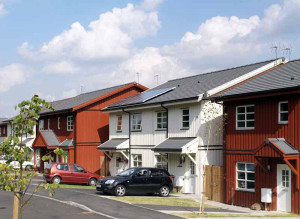“Houses that sweat, chimneys that soak up heat, and solar power systems for cloudy climates – as the housing industry gets back on its feet, there are terrific opportunities in green technology,” says Michael Overduin, the CEO of Science Capital.
An recent event in Birmingham brought together industry leaders, SMEs, academics and investors in a bid to strengthen links and drive growth in the housing sector. Their focus on working together to build a green deal contrasts sharply with the UN climate change talks in Bonn that end today with little agreement on extending the Kyoto Protocol.
Speakers at last Wednesday’s meeting included representatives of local firms who highlighted the opportunities for the region in supplying the UK’s £15 billion housing retrofit needs. There are 26 million homes that must be improved if we are to hit our national energy efficiency targets.
Richard Brooks from sponsors Anthony Collins Solicitors set out a challenge to deliver the low carbon economy whilst meeting the needs of local communities hit by fuel poverty or long term unemployment by offering targeted training and job opportunities.
Chris Handy showed terraced homes that “put money in people’s pockets”. These houses process their own waste and are entirely carbon neutral. Chris is Chief Executive of the Accord Group, which is opening a new factory in Walsall to manufacture low carbon timber homes.
Malcolm McIntosh, who directs the Asia Pacific Centre for Sustainable Enterprise, argued that we need to “remove perverse subsidies for polluting industries”. The future, he says, requires “an engaged democracy and real leadership”.
Matthew Rhodes, managing director of Warwickshire-based Encraft, demonstrated how small companies are best suited to deliver large scale change. Like his own 30-strong team, they can engage local skills and work alongside homeowners in deciding the most suitable improvements.
Lubo Jankovic from Birmingham City University provided an insight into Birmingham’s first Zero Carbon house. This 4-bed house with studio loft in Balsall Heath generates more energy than it uses, even throughout this recent harsh winter. He believes the key to unlocking the market lies in education of more zero carbon designers, as the economics and technology already make sense.
Six companies also presented their new technologies to a panel of Birmingham’s top legal and investment firms including Midven, Beer & Partners, Mercia Fund and Advantage Business Angels.
- Paul Chadwick, director of Ergohome, presented hi-tech prefabricated houses that are suitable for any climate or location. They are ready to be rolled out nationally, today.
- Leon Jacob, director of Abacus Solar, talked about his new composite solar panels that increase thermal output by four times, thereby significantly boosting energy gains.
- Piers Cave, director of Eco Answers, showed a raised loft flooring system. It is very quick and easy to install, works in virtually any loft, and greatly reduces heat loss.
- Mark Thompson at AceOn Solar is developing portable energy products including solar modules and power systems. He argued for the need to assemble locally to meet the growing global market.
- Sean Derrig from Chemex is introducing friendly bacteria into frontline emergency medicine services, hotels and restaurants. These provide cleaner and safer working environments.
- Thomas Lipinski, chief technology officer of Green Structures, showed a heat recovery system that fits in a chimney stack and ‘skins’ for adaptive houses that absorb energy or sweat heat depending on environmental conditions.
Together these technologies provide an exciting range of opportunities for business growth with commitment for local government, industry and universities to work together to help local SMEs flourish.
The Science Capital event at Hotel du Vin on June 15, 2011 was organised by Professor Michael Overduin.





